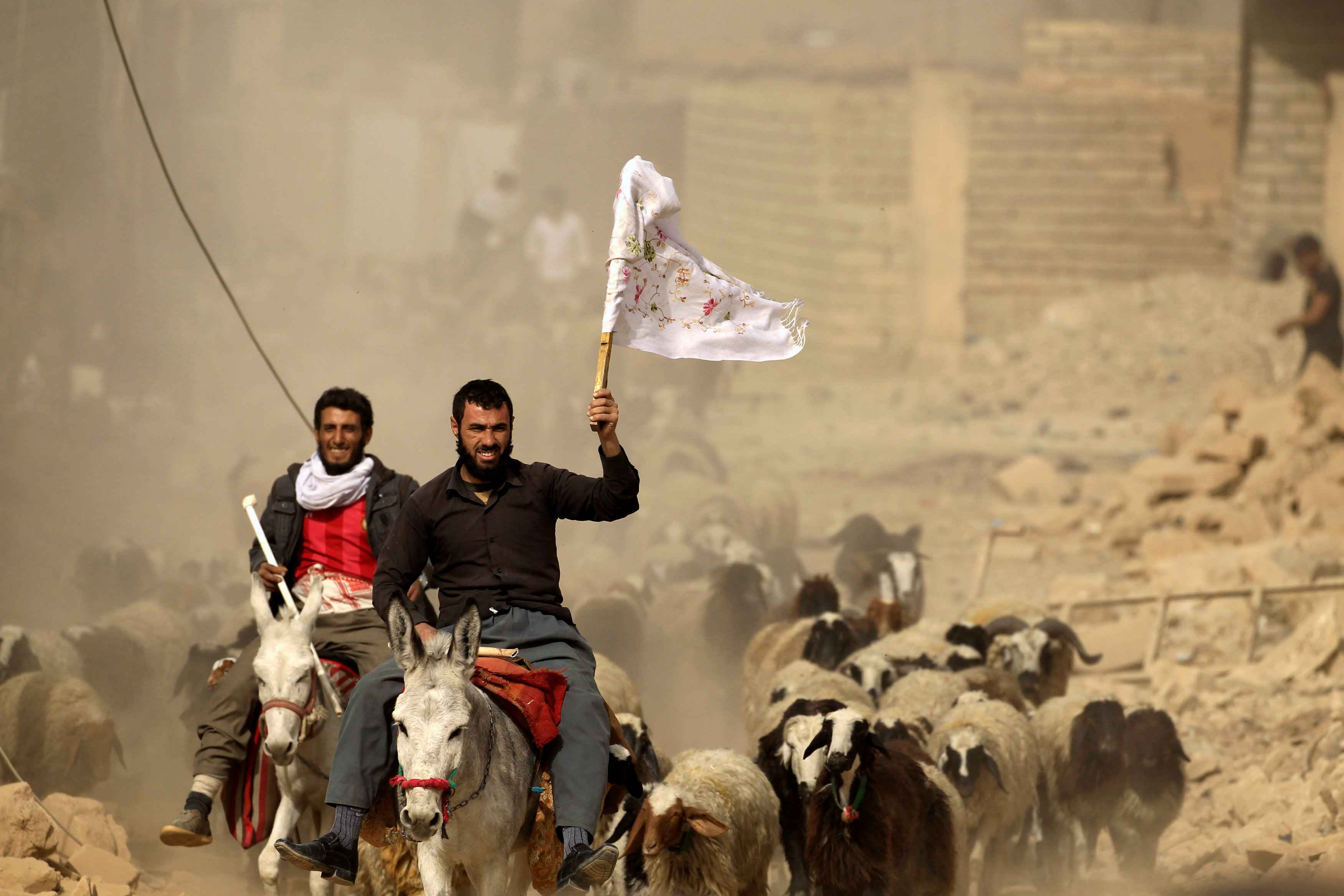
By Stephen Kalin and Dominic Evans
EAST OF MOSUL, Iraq (Reuters) – Iraqi forces battled Islamic State fighters on the eastern edge of Mosul on Tuesday as the two-week campaign to recapture the jihadists’ last main bastion in Iraq entered a new phase of urban warfare.
Artillery and air strikes pounded the city, still home to 1.5 million people, and residents of the eastern neighborhood of al-Quds said the ultra-hardline Sunni militants had resorted to street fighting to try to hold the army back.
Soldiers of the elite Counter Terrorism Service (CST) also entered the state television station in Mosul on Tuesday, the first capture of an important building in the Islamic State-held city since the start of the offensive about two weeks ago, the force commander, Lieutenant-General Talib Shaghati, said.
“This is a good sign for the people of Mosul because the battle to liberate Mosul has effectively begun,” Shaghati said.
Iraqi troops, security forces, Shi’ite militias and Kurdish peshmerga have been advancing on several fronts toward Mosul, backed by U.S.-led troops and air forces. Special forces units sweeping in from the east have made fastest progress.
“We are currently fighting battles on the eastern outskirts of Mosul,” CTS Lieutenant-General Abdul Wahab al-Saidi said. “The pressure is on all sides of the city to facilitate entry to the city center.”
He said CTS forces had cleared Islamic State fighters from most of the eastern district of Kokjali, close to al-Quds, on Tuesday, “so now we are inside the district of Mosul”.
Blackish grey smoke hung in the air east of the Islamists’ stronghold and the regular sound of outgoing artillery fire could be heard, said a Reuters reporter near Bazwaia, about five km (three miles) east of Mosul.
Inside the city, residents speaking to Reuters by telephone said they heard the sounds of heavy clashes since dawn.
One inhabitant of al-Quds district at the city’s eastern entrance said bullets were fizzing past and hitting the walls of houses, describing the explosions as “deafening and frightening”. Many people in the area have stayed indoors for the last two days.
“We can see Daesh (Islamic State) fighters firing towards the Iraqi forces and moving in cars between the alleys of the neighborhood. It’s street fighting.”
One witness said he saw nine cars, laden with families and furniture, heading from the eastern half of the to the west bank of the Tigris River to escape the encroaching frontline.
Away from the eastern fringe of the city, however, traffic was relatively normal, markets were open, and Islamic State fighters were patrolling as usual.
“CHOP THE SNAKE’S HEAD”
Mosul is many times bigger than any other city held by Islamic State in Iraq or Syria. Its recapture would mark the collapse of the Iraqi wing of the caliphate which it declared in parts of both countries two years ago, although the hardline Sunni militants have recovered from other setbacks in Iraq.
Prime Minister Haider al-Abadi said on Monday that Iraqi forces were trying to close off all escape routes for the several thousand Islamic State fighters inside Mosul.
“God willing, we will chop off the snake’s head,” Abadi, wearing military fatigues, told state television. “They have no escape, they either die or surrender.”
Commanders have warned that the fight for Mosul, which could be the toughest of the decade-long turmoil since the U.S. invasion which overthrew Saddam Hussein in 2003, is likely to last for months.
The United Nations has said the Mosul offensive could also trigger a humanitarian crisis and a possible refugee exodus if the civilians inside in Mosul seek to escape, with up to 1 million people fleeing in a worst-case scenario.
The International Organisation for Migration said that nearly 18,000 people have been displaced since the start of the campaign on Oct. 17, excluding thousands of villagers who were forced back into Mosul by retreating jihadists who used them as human shields.
U.N. human rights spokeswoman Ravina Shamdasani said Islamic State fighters tried to force another 25,000 civilians from a town south of Mosul back toward the city on Monday. Most of the trucks carrying them turned back under pressure from patrolling aircraft, she said.
Not all those heading back were doing so under duress from the militants, according to Mosul residents who said people were streaming in from the south as military operations edged closer to the city.
Most came without any belongings, though some brought sheep and a few camels into the city, they said.
In Bazwaia, CTS guards told Reuters that a suicide car bomber tried to attack their position early on Tuesday, but they halted it with machinegun fire. Rubble and parts of the attacker’s body could still be seen by a nearby berm.
As well as the suicide attacks, the Islamic State militants have slowed the army’s advance with snipers, mortar fire, roadside bombs and booby traps inside abandoned buildings.
In Bazwaia, recaptured by Iraqi troops a day earlier, about a dozen civilians could be seen coming out of the village, waving white flags and bringing with them their livestock — about 200 sheep and a few cows and donkeys.

A man who just fled Bazwaia village carries a white flag as he arrives at a special forces checkpoint, east of Mosul, Iraq, November 1, 2016. REUTERS/Zohra Bensemra
Saidi, the CTS officer, said 500 civilians had already been moved from Bazwaia to a camp for displaced people further away from the frontline.
“We expect to encounter more civilians as we push through the city,” he said.
(Additional reporting by Saif Hameed and Ahmed Rasheed in Baghdad and Tom Miles in Geneva, Writing by Dominic Evans in Baghdad, Editing by Angus MacSwan)









